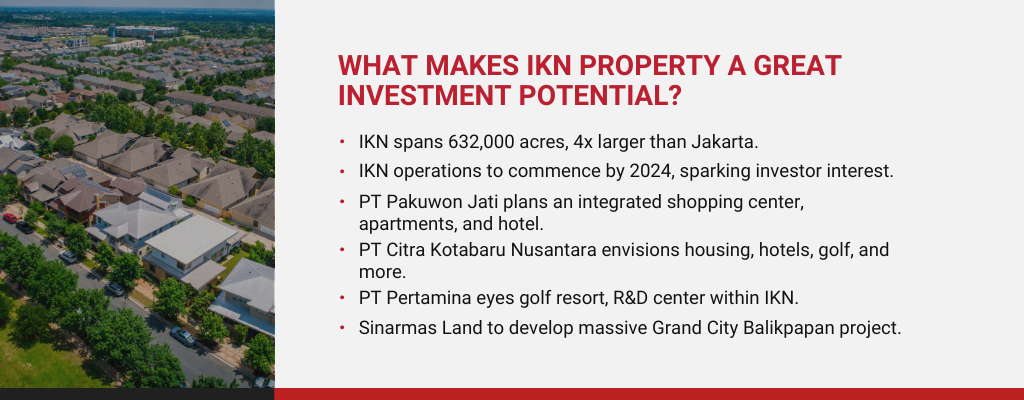As global investment trends shift, IKN Nusantara’s unique appeal takes the stage in the property market. “IKN Nusantara” refers to the New Capital of Indonesia, a groundbreaking initiative to redefine urban and economic landscapes. In this article, we will explore the qualities that make IKN Nusantara property an enticing investment prospect, where financial gains align with shaping a vibrant future for Indonesia.
Potential property investment in IKN Nusantara

Ibu Kota Nusantara (IKN) is located on a vast 632,000-acre area Its size is approximately four times larger than the current capital, Jakarta, and the government expects to begin IKN operations by 2024. The initiative has captured the attention of notable property developers in Indonesia, prompting them to invest in the IKN.
PT Pakuwon Jati Tbk (PWON) sets out to construct a shopping center with apartments and hotel integrations. The developer will build the megastructure in the Core Government Center (KIPP) area of Sepaku District, Penajam Paser Utara (PPU).
PT Citra Kotabaru Nusantara (Ciputra Group) also plans to develop an integrated area within the IKN. The plan will include residential complexes, a hotel, a golf course, MICE facilities (meeting, incentive, conference, and exhibition), and a botanical garden.
Moreover, State-owned company BUMN PT Pertamina (Persero) has expressed interest in establishing supporting facilities within the IKN. These include a resort area with a golf course and a research and development center. In addition, Sinarmas Land aims to create a township named the Grand City Balikpapan project in East Kalimantan. The project will claim the largest project in the province.
These investment plans will leverage government-provided facilities to ease investors to do business in the IKN.
Benefits of investment in IKN properties
The project of IKN construction costs approximately USD 35 billion. It provides ample opportunities for businesses to be involved in establishing Indonesia’s new capital city. Through Government Regulation No. 12/2023, the Indonesian government aims to offer a range of fiscal and non-fiscal incentives for businesses interested in investing in IKN Nusantara. These incentives include:
1. Income tax reductions and holidays
The government is set to offer a substantial corporate income tax exemption. The tax exemption ranges from 10 to 30 years, with the possibility of a 100 percent waiver. It will apply to domestic investors who contribute a minimum of IDR 10 billion to IKN.
Businesses focused on enhancing public services will receive the longest tax holiday extending to 2035. Banks and insurers that invest before 2035 can relish a tax exemption spanning up to 25 years, while those who make investments preceding 2045 are eligible for a 20-year income tax exemption.
Investors who aim to establish financial centers within the IKN and businesses that relocate their headquarters to the IKN will also gain access to corporate income tax reductions. Furthermore, enterprises engaged in specific research and development endeavors will enjoy a reduction in their gross income.
2. Foreign workers facilities
Companies operating IKN can employ foreign employees for up to 10 years, which can be prolonged. These foreign workers can also get residency permits for ten years, and these permits can be extended based on their contracts.
Employers are exempted from paying the Foreign Worker Compensation Fund, a monthly fee of USD 100 paid to the Ministry of Manpower for the foreign workers they hire.
Foreign workers in managerial roles at companies in the IKN can maintain their residency permits as long as they hold their current positions.
3. Land rights
Investors can obtain land use permits for 95 years, with the option to renew for an additional 95 years, resulting in a cumulative land use term of 190 years.
There will be two categories of land in IKN:
- State-owned property managed by the Nusantara Capital City Authority (Otorita Ibu Kota Nusantara/OIKN), a special agency that governs and manages the IKN;
- Assets conveyed to OIKN through the right-to-manage (Hak Pengelolaan – HPL) deed titles.
The OIKN can allocate these HPL lands to investors for the following land rights/titles:
- Right to cultivate (Hak Guna Usaha – HGU);
- Right to build (Hak Guna Bangunan – HGB); and
- Right to use (Hak Pakai – HP).
4. Customs
The government provides waivers on import tariffs for bringing in goods utilized in the construction and development of IKN. Moreover, import duty exemptions are applicable for goods and materials imported to foster industries within the IKN.
Read more: Positive Investment List improves investment in Indonesia
Potential challenges associated with IKN property development
The Ministry of Public Works and Public Housing listed some potential challenges in housing development in IKN.
1. Environment-friendly technology
The availability of environmentally friendly technology to ensure the attainment of the IKN’s key performance indicators (KPI) and clean construction remains one of the main challenges.
2. Supply chain support
Developers need effective and efficient supply chain support to utilize existing resources in East Kalimantan and maximize the use of local content (Tingkat Komponen Dalam Negeri/TKDN)
3. Non-state budget funding
The state budget (APBN) only covers 20% of the funding, and instead, the other 80% of funds for the development of IKN should come from different financial sources.
4. The need for dashboard monitoring
The government requires a dashboard to oversee the progress of housing construction and essential infrastructure development in IKN.
Conclusion
The IKN construction costs approximately USD 35 billion and is considered the most significant project in Southeast Asia, providing businesses with massive opportunities for property development. With the government’s plan to start IKN operation in 2024, companies can utilize the momentum to secure strategic projects in IKN.
Businesses can consider working with local expertise to maximize IKN investment opportunities. InCorp Indonesia, with more than a decade of experience in the market, offers company registration and business license services to help your business capture investment opportunities in one of the megaprojects in the Southeast Asia region.
Contact our consultants to maximize this opportunity by clicking the button below.
Get in touch with us.
What you'll get
A prompt response to your inquiry
Knowledge for doing business from local experts
Ongoing support for your business
Disclaimer
The information is provided by PT. Cekindo Business International (“InCorp Indonesia/ we”) for general purpose only and we make no representations or warranties of any kind.
We do not act as an authorized government or non-government provider for official documents and services, which is issued by the Government of the Republic of Indonesia or its appointed officials. We do not promote any official government document or services of the Government of the Republic of Indonesia, including but not limited to, business identifiers, health and welfare assistance programs and benefits, unclaimed tax rebate, electronic travel visa and authorization, passports in this website.



